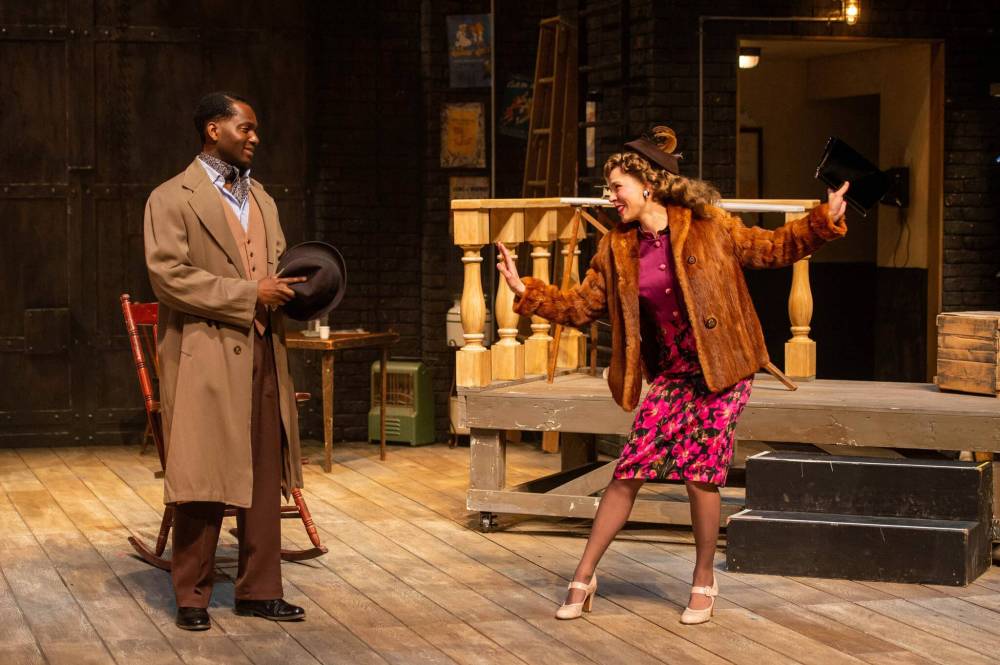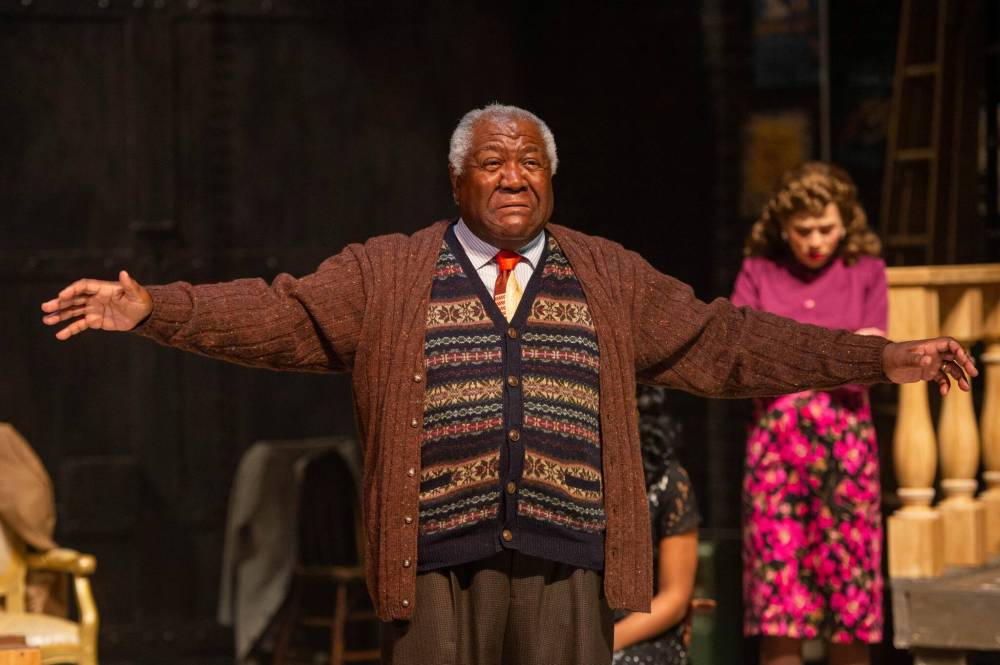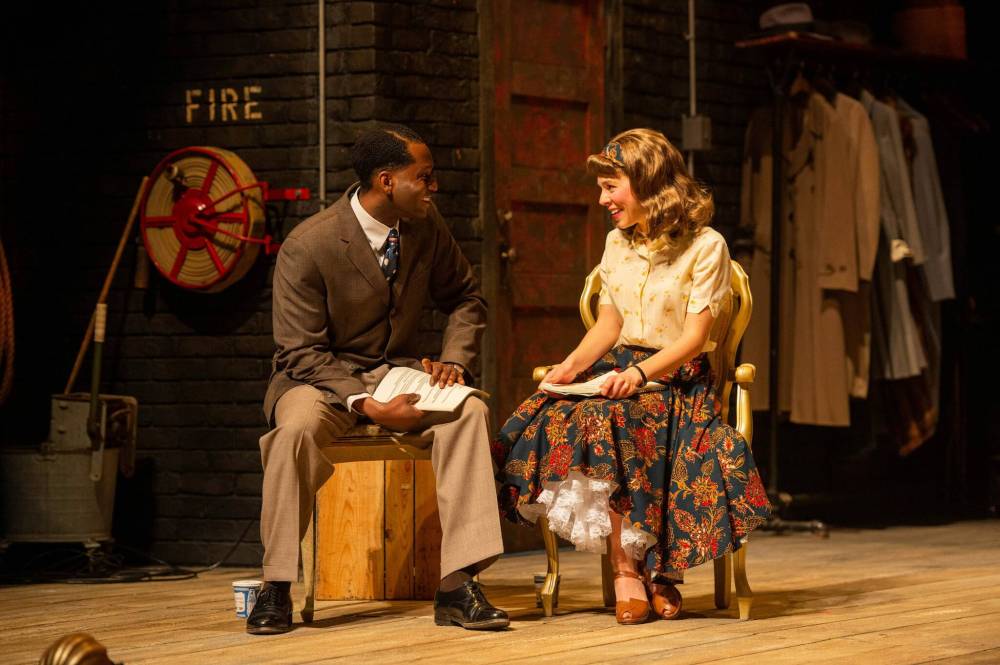Roars and racism backstage Outstanding cast of RMTC dramedy Trouble in Mind shine light on uncomfortable truths of 1955 — and today
Read this article for free:
or
Already have an account? Log in here »
To continue reading, please subscribe:
Monthly Digital Subscription
$0 for the first 4 weeks*
- Enjoy unlimited reading on winnipegfreepress.com
- Read the E-Edition, our digital replica newspaper
- Access News Break, our award-winning app
- Play interactive puzzles
*No charge for 4 weeks then price increases to the regular rate of $19.00 plus GST every four weeks. Offer available to new and qualified returning subscribers only. Cancel any time.
Monthly Digital Subscription
$4.75/week*
- Enjoy unlimited reading on winnipegfreepress.com
- Read the E-Edition, our digital replica newspaper
- Access News Break, our award-winning app
- Play interactive puzzles
*Billed as $19 plus GST every four weeks. Cancel any time.
To continue reading, please subscribe:
Add Free Press access to your Brandon Sun subscription for only an additional
$1 for the first 4 weeks*
*Your next subscription payment will increase by $1.00 and you will be charged $16.99 plus GST for four weeks. After four weeks, your payment will increase to $23.99 plus GST every four weeks.
Read unlimited articles for free today:
or
Already have an account? Log in here »
Hey there, time traveller!
This article was published 17/02/2023 (1027 days ago), so information in it may no longer be current.
The playwright Alice Childress’ Trouble in Mind begins and ends in a brick-walled Harlem theatre, where the props are stacked haphazardly toward the rafters, looking as though they may tip over and crash at any moment. A red light glows above the entryway. The year is 1957.
One by one, the members of the cast of a fictional play called Chaos in Belleville arrive. The first to make her way inside is Wiletta Mayer (an incendiary Alana Bridgewater) a veteran Black actor from Newport News, Va., who is repeatedly made to feel like an imposter, even when she is being paid to be there. All she has ever wanted to be is an actor. If others can, why not her?
THEATRE REVIEW
Trouble in Mind
● Royal Manitoba Theatre Centre
● Runs to March 11
★★★★ out of five
The next to strut in is John Nevins (a nebbishy and anxious Andrew Broderick), a newbie with few credits but an unbroken belief in the truth — the unvarnished elegance — of the theatre.
He is of the mind that theatre can change the world: the imposing Wiletta and the dapper, avuncular Sheldon Forrester (played with perfect comic timing by Alvin Sanders) are wary of that notion.
They understand something the young Mr. Nevins has yet to be given the opportunity to learn for himself: every member of a theatre cast is ultimately still a member of a societal caste, subject to the whims of the man in the director’s seat and the men who foot the bill. In 1957, on and off-Broadway, those men were usually, if not always, white.

“Management hates folks who need jobs,” Wiletta tells John. “White folks can’t stand unhappy negroes,” she adds, saying the quiet part loud. “(The director) is gonna ask your honest opinions,” she advises. “Don’t give them.”
To be a part of a production of any kind is to know when to bite one’s tongue and when to flap one’s gums. The blathering, privilege-denying director Al Manners (played by Geoffrey Pounsett) likes the sound of his own voice, and by virtue of wearing two-toned, black-and-white wingtips, seems to believe he has walked a day in a Black person’s shoes. (Costume designer Sarah Uwadiae makes subtle but brilliant choices.)
Chaos in Belleville, he tells the cast, is about the “dynamic, explosive” “race situation.”
“I’m ready to sweat blood,” he says. He’s never sweated a day in his lucky little life.
MIKAELA MACKENZIE / WINNIPEG FREE PRESS Winnipeg’s Cherissa Richards directs Trouble in Mind.
The play within a play is ambling and incomprehensible: if it feels as if it were written by someone who has no grasp of the subject matter, it’s because it was. That’s the wonder of this complex show, directed with a sure hand by Winnipeg’s Cherissa Richards: there often exists more truth backstage than on it, so long as the audience and the author are not yet ready to confront reality head-on. Some would rather bury their heads in the sand than look to the other side of the segregated beach.
Childress did not want to hold up a funhouse mirror to the daily racism she and other Black professionals faced in the American theatre. When Trouble in Mind debuted, in 1955, Childress became the first Black woman to win an Obie Award for best off-Broadway play. When the play was considered to be staged on Broadway, Childress was asked to make hundreds of changes to placate white audiences. She refused, and Trouble in Mind didn’t debut on Broadway until 2021, 27 years after her death.

It’s a real tragedy to consider how many honest scripts spent their lives in dusty desk drawers or were too covered in a producer’s red ink to tell their truth. Childress was not the only one pushed aside, and this type of censorship still undoubtedly happens today in the form of aggressions, both macro and micro.
Each actor in the ensemble is an extension of Childress and her cohort, and is likely based on real people she worked with as an actor in the 1940s, including with the burgeoning American Negro Theatre.
The dazzling Millie Davis (Reena Jolly) enjoys the finer things in life, and knows her power over men and women alike; this character deserves more space. Judy Sears (Jodi Kristjanson) is Yale educated but can barely read her lines. Bill O’Wray (Alex Poch Goldin) is a selfish bastard who, while in character, sounds like the racist former Alabama governor George Wallace. A sweet old stagehand (Glenn Nelson) and a hapless stage manager (Oscar Derkx) are bullied by the director all the same.

While the play is often side-splittingly funny, there is sometimes a hesitance by the audience members to laugh at the proper moments, and at times, moments meant to induce laughs instead induce sighs of sympathy. This is part of the show’s intricacy: it understands that the very nature of life, and its inherent trauma, transforms depending on who is holding the pen and who is watching it unfold.
When the play begins, there is a disagreement between Judy and Millie. Judy believes all people are the same. Millie wishes that were true.
She is told by Manners to deliver her lines “full of ginger.”
“This isn’t carrying trays or answering doorbells,” Manners tells Wiletta. “This is substance.”
Though the whole cast is exceptional, Sanders and Bridgewater are remarkable, both tasked with holding the play’s moral compass.
In the hands of an unworthy director, the arc of a story gets distorted and misshapen, skewed to fit expectations, not challenge them. When people get to tell their own stories, their way, that is when the truth can actually be shared.
Trouble in Mind does that. Chaos in Belleville never could.
ben.waldman@winnipegfreepress.com

Ben Waldman is a National Newspaper Award-nominated reporter on the Arts & Life desk at the Free Press. Born and raised in Winnipeg, Ben completed three internships with the Free Press while earning his degree at Ryerson University’s (now Toronto Metropolitan University’s) School of Journalism before joining the newsroom full-time in 2019. Read more about Ben.
Every piece of reporting Ben produces is reviewed by an editing team before it is posted online or published in print — part of the Free Press‘s tradition, since 1872, of producing reliable independent journalism. Read more about Free Press’s history and mandate, and learn how our newsroom operates.
Our newsroom depends on a growing audience of readers to power our journalism. If you are not a paid reader, please consider becoming a subscriber.
Our newsroom depends on its audience of readers to power our journalism. Thank you for your support.







